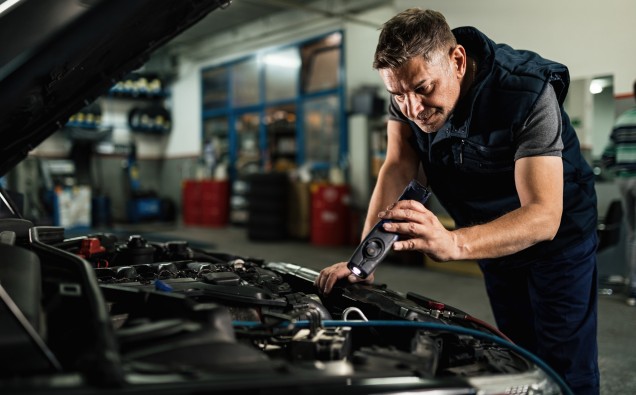As a new year approaches, automotive data experts at HPI recommend that drivers make a set of resolutions that will keep them safe on the road throughout 2025 and beyond.
HPI is urging motorists to double-check that they are not putting themselves, passengers or other road users at risk by driving a vehicle which has a hidden history. Over 250 cars are flagged daily for security concerns, and 1 in every 28 cars on HPI’s register has been written off. Furthermore, over 50,000 vehicles were flagged as stolen in 2024 and over 662,297 cars have already been caught this year with altered mileage readings, meaning your vehicle could be hiding the truth.
Here are some suggested resolutions for vehicle safety that HPI recommends:
Prioritise vehicle maintenance.
Regular maintenance checks will ensure your vehicle remains in optimal condition. It helps prevent potential mechanical failures that could compromise safety. Also, remember to keep all records and paperwork up to date, such as service books and MOTs. It can help to preserve or even boost the value of your vehicle when you come to sell it. Neglecting car maintenance poses a financial burden and can compromise safety. Poorly maintained vehicles contribute to accidents across the UK, with issues such as faulty brakes and worn-out tyres being common culprits. Establishing a proactive maintenance plan ensures your car is safe and helps identify minor problems before they escalate. Regular checks on tyre pressure, engine oil levels, coolant levels, and the screen wash system are essential.
Stay on top of vehicle software updates.
Keep vehicle software up to date with manufacturer recalls to help prevent the rising trend of key code hacking. As keyless entry has become increasingly more common in cars it has driven a rise in car theft. With technology available online, a thief can intercept the code sent out by the key and create an unlocking code for your car, allowing them to gain access to it and drive off. It’s essential to check if your car is subject to any recalls that will cover security and safety upgrades.
Get your vehicle’s mileage checked.
Over 1,800 cars are flagged every day with inaccurate mileage, so it’s important not to get tricked by a clocked odometer. In addition, nearly one in 10 cars checked is found to have a mileage discrepancy.
Check your car’s identity and make sure it hasn’t been cloned.
The practice of cloning involves changing a car’s identity. It usually happens because the car has been stolen, and thieves want to sell it quickly to an unsuspecting buyer. It can also occur when organised criminals want to avoid detection, so they clone a car that can’t be linked to them or, at a lower level, when offenders want to avoid paying traffic or parking fines generated by ANPR cameras. Falsifying a car’s identity can involve changing the number plates, forging documents such as the V5 (the registration certificate) and tampering with the Vehicle Identification Number (VIN).
Don’t get scammed if you buy a used car.
If you’re in the market for picking up a used car in 2025, there are many things you have to consider before parting with your money. Working out what to buy, where to buy it and how to buy something that isn’t a liability can be a minefield, but if you do your homework, you can minimise the risks. One surest way to protect yourself is by investing in an HPI vehicle history check, which will flag whether the car is an insurance write-off, has been stolen, has outstanding finance on it, or has been clocked.
Know your vehicle’s history.
Whether you’re buying a used car or already own one, it’s essential to understand its history. The HPI Check Report will flag any worrying information held against the vehicle by finance and insurance companies, the DVLA, the Police, and other industry bodies. A comprehensive HPI Check is the most important check before buying a used car and is the first line of defence against vehicle fraud.
Drive economically for safer, cheaper motoring.
Given the ongoing cost-of-living challenges and fluctuating fuel prices, driving economically can offer surprising savings. Combining trips, maintaining steady speeds, and reducing unnecessary stops can all contribute to overall vehicle safety. Smooth driving with gentle acceleration, avoiding sudden braking, and maintaining a safe distance from the vehicle in front are all effective techniques for economical driving. Embrace these habits to improve safety, save money, and contribute to a more sustainable approach to driving.
Matt Freeman, managing consultant at HPI, said: “Checking a car for mileage discrepancies comes as standard in the HPI Check. By building up a history of a vehicle’s mileage across multiple data sources and millions of records, any discrepancies are highlighted, arming car buyers with the information and confidence they need when dealing with used cars. The company is continually enhancing its data as it invests to help motorists tackle fraud and safety issues.
“An HPI check will verify the VIN number, provide a guide valuation and estimated fuel costs, and include an MOT history check. It can identify if the car has been written-off, protect against cloning, has previously been stolen or has any mileage discrepancies or outstanding finance left to pay.”
HPI first launched its vehicle history check in 1938, highlighting that used car scams are nothing new. Conveniently absent documents, questionable mileage or something in a car’s back story that doesn’t quite stack up are just a few indicators that a potential purchase may not be all it seems.
Added Matt Freeman: “Checking important features such as a car’s mileage with HPI, as well as looking more closely at the vehicle’s comprehensive history, can give drivers peace of mind regarding mileage and vehicle provenance and can lead to safer, happier motoring.”

















